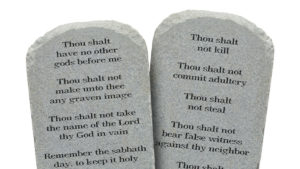Why Sacrifice a poor animal for YOUR own sins?
IN SHORT… If a person believes that a blood sacrifice were necessary in order for G-d to forgive human sin, then that person forgot to study the Five Books of Moses. Even a single example where G-d forgave without a blood sacrifice would prove that this idea is unbiblical. There are many such examples, but the most interesting is found in the Book of Leviticus. The reason this is so interesting is that it appears right in the middle of the discussion of sin sacrifices. In Leviticus 5:11-13, it states,
‘If, however, he cannot afford two doves or two young pigeons, he is to bring as an offering for his sin a tenth of an ephah of fine flour for a sin offering.’
In Jonah 3:10, we also see that one does not need a blood sacrifice for the forgiveness of sins. There, the Bible simply states that Gd saw the works of the people of Niniveh. Specifically it says that these works consisted of abandoning their evil ways, and because they did, Gd forgave them. There are many other examples. Therefore, as was stated earlier, the idea that one needs a blood sacrifice for the forgiveness of sins is unbiblical.
Learn More ⇒ what jews believe.org.2
IN SHORT… The Bible is clear, and it is consistent:
one person cannot die for the sins of another.
In other words, the sins committed by one person cannot be wiped out by the punishment given to another. In Exodus 32:30-35, Moses asks Gd to punish him for the sin committed by the people in regards to the Golden Calf. Gd tells Moses that the person who committed the sin is the one who must receive the punishment. Then, in Deuteronomy 24:16, Gd simply states this as a basic principle,
‘Every man shall be put to death for his own sin.’ This concept is repeated in the Prophets, in Ezekiel 18: ‘The soul that sinneth, it shall die… the righteousness of the righteous shall be upon him, and the wickedness of the wicked shall be upon him.’
The prophet Jeremiah looks to the day when the mistaken belief that one man’s death atones for another man’s sins shall no longer be held by anyone: in Jeremiah 31:29-30, the prophet says: ‘In those days they shall say no more, The fathers have eaten a sour grape, and the children’s teeth are set on edge. But every one shall die for his own iniquity: every man that eateth the sour grape, his teeth shall be set on edge.’
Learn More⇒ what jews believe.org/1 * chabad.org/Animal-Sacrifices
We stopped offering sacrifices because we do not have a proper place to offer them. The Torah specifically commands us not to offer sacrifices wherever we feel like it; we are only permitted to offer sacrifices in the place that G-d has chosen for that purpose. Deut. 12:13-14. It would be a sin to offer sacrifices in any other place, akin to stealing candles and wine to observe Shabbat.
But isn’t a blood sacrifice required in order to obtain forgiveness?
No. Although animal sacrifice is one means of obtaining forgiveness, there are non-animal offerings as well, and there are other means for obtaining forgiveness that do not involve sacrifices at all. The Biblical book of Jonah tells of an entire community condemned to destruction that was forgiven when they simply repented and fasted, without ever offering any sacrifice, blood or otherwise. (Jonah 3)
The passage that people ordinarily cite for the notion that blood is required is Leviticus 17:11: “For the soul of the flesh is in the blood and I have assigned it for you upon the altar to provide atonement for your souls; for it is the blood that atones for the soul.” But the passage that this verse comes from is not about atonement; it is about dietary laws, and the passage says only that blood is used to obtain atonement; not that blood is the only means for obtaining atonement. Leviticus 17:10-12 could be paraphrased as “Don’t eat blood, because blood is used in atonement rituals; therefore, don’t eat blood.” jewfaq.org/qorbanot
Guaranteed Issue - No Pre X Clause
Quote & Subsidy Calculation
No charge for our complementary services
Watch our 10 minute VIDEO
that explains everything about getting a quote


